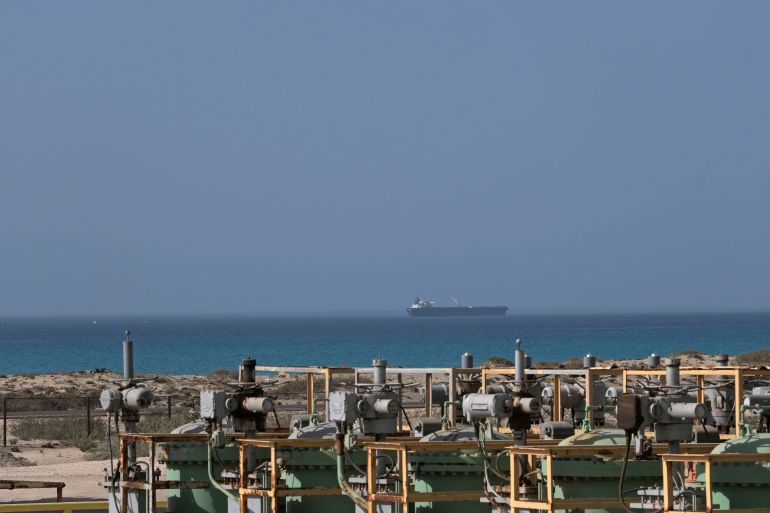Libya’s NOC says output halted at major ports and fields
National Oil Corporation warns of a ‘painful wave of closures’ after forces in the east expanded their blockade of the sector.

Libya’s National Oil Corporation has announced the closure of operations in major oil fields after staff in the key export terminal of Zueitina were blocked from working.
The company said it could no longer implement contractual obligations for oil deliveries from Zueitina terminal or from its biggest oil field, Sharara, after previously saying it had halted production at another field, Al-Fil.
Keep reading
list of 4 itemsUN: At least 35 presumed dead after boat capsizes off Libya coast
‘No capitulation’: Russian Wagner group likely to stay in Libya
UN Libya mission uncovers abuse, investigates mass graves
“The National Oil Corporation is obliged to declare a state of force majeure on the oil port of Zueitina, including all fields and producing stations associated with this port and shipping facilities until further notice,” NOC chief Mustafa Sanalla said in a statement on Monday.
Declaring force majeure is a legal move allowing parties to free themselves from contractual obligations when factors such as fighting or natural disasters make meeting them impossible.
“These interruptions were caused by the entry of a group of individuals into the port of Zueitina,” the firm said in a statement, adding that the group “prevented workers” from continuing exports.
Zueitina is one of the four oil terminals in the so-called “Oil Crescent” region, and its closures will prevent Libya from exporting almost a quarter of its 1.2 million barrels per day of production.
Sanalla warned of a “painful wave of closures” in the North African nation at a time of an “oil and gas price boom”.
The NOC is one of the few institutions in the troubled country to have stayed in one piece. Oil revenues are vital to the economy, with Libya sitting on Africa’s largest known reserves.
Political divisions
Libya has struggled to extricate itself from a decade of chaos and conflict that followed the toppling of dictator Muammar Gaddafi in a 2011 NATO-backed uprising.
The country has recently found itself again with two rival governments after the eastern-based parliament in February appointed a new prime minister in a direct challenge to the United Nations-backed government in Tripoli.
Fathi Bashagha, a former interior minister, was named prime minister in February by the House of Representatives, which has been based in Tobruk.
Abdul Hamid Dbeibah, who is based in the capital, Tripoli, has refused to step down as interim prime minister and insists he will hand over power only to an elected government.
The groups blocking the oil port are seen as favouring the eastern camp, and are demanding “a fair distribution” of income and the transfer of power to Bashagha.
Sanalla repeated calls for the “neutrality” of the oil sector to be protected, “avoiding the political conflicts in the country”.
Pumping of crude was stopped in the oil fields of Abuatufol, Al-Intisar, Anakhla and Nafura, all of which ship their oil through Zueitina, the NOC added.
It said that after the “forced closure” of the Al-Fil field on Saturday night, workers of several companies were “forced” into a shutdown of production at several sites.
Protesters at Zueitina had said in a video statement on Sunday they would halt production until Dbeibah leaves office, and they demanded Sanallah be sacked after NOC transferred oil revenue to the Central Bank of Libya.
Dbeibah’s Finance Ministry said the NOC transferred $6bn of oil revenues to its account in the central bank on Thursday.